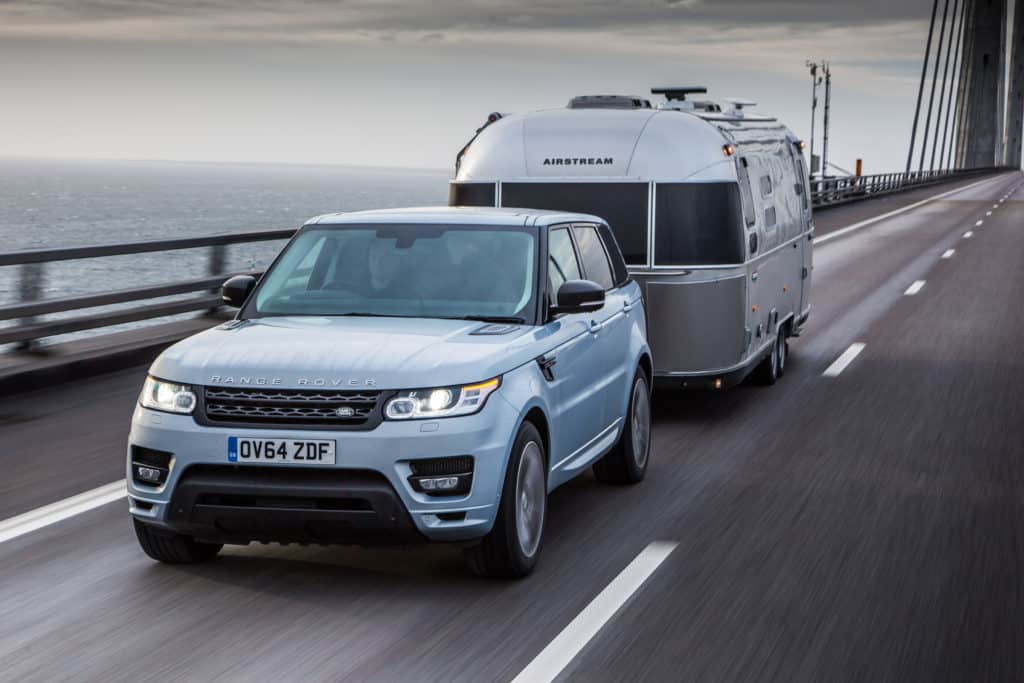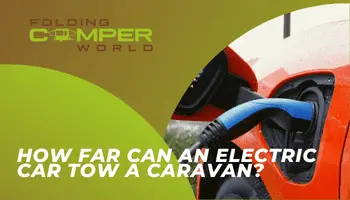Since many people have been showing interest in electric cars over recent years, many people in the camping community have become curious about their ability to tow a caravan. Hybrid cars have been the most popular as they use both an internal combustion engine and an electric motor. This makes them great for towing caravans; however, not all pure electric cars can tow caravans. Some specific electric cars can tow caravans very well; however, can they tow caravans for long enough before they need to be recharged? This is a question that many users have been asking on online forums.
The answer to this depends on exactly which electric car you have and how much your caravan weighs. It’s also important to note that the weight of your caravan should always be within the towing capacity of your electric car. Generally, most electric cars suitable for towing caravans can manage to travel around 100 miles before they need to be recharged. This blog post will look into how far electric cars can tow caravans in more detail and discuss some of the possible issues they may have.
This blog post will cover the following:
- Electric cars as towing vehicles
- How far can electric cars tow (their range)
- Possible issues with electric tow cars
Electric cars as towing vehicles

When looking at how electric cars work, it seems they would be perfect for towing. However, very few electric cars have been approved for towing, with the Tesla Model X being one of the few to be selected. That being said, in more recent years, more electric cars have joined this list of towing cars, such as the Audi e-Tron, Jaguar I-Pace and the Mercedes-Benz EQC. These cars can be attached with a tow bar that will enable them to tow caravans. There is still a lot to think about when using an electric tow car, such as the weight of the load and its effects on the range (how far the car will go in one full charge) of the car.
As with any car, each electric car’s towing capacity is different. The Jaguar I-Pace has a towing limit of 750kg. This means it cannot tow a full-size caravan, but it can tow a small trailer. Other electric cars such as the Audi and Mercedes-Benz can tow 1,800kg, and the Tesla Model X can tow an impressive 2,250kg. The towing capacity is an important figure to keep in mind as it determines which caravans your car can tow and plays a role in how far it can travel before needing to be recharged.
The main reason electric cars would be suitable for towing is that both the car and trailer tend to be more stable when the car weighs considerably more than what it’s towing. Electric cars are perfect because they have large battery packs that weigh quite a lot compared to diesel and petrol cars. However, there are many other things that need to be considered when using an electric car as a towing vehicle, which will be discussed at the end of this blog post.
How far can electric cars tow (their range)

The distance an electric car can go within one complete charge cycle is known as its range. This is something that needs to be considered if you are planning on investing in an electric car. As explained earlier, the range for each car will be different as it depends on the make of your specific car as well as its towing capacity. Towing a caravan reduces the capacity and range of an electric car battery by quite a significant amount. Sometimes, this can mean that the car can only travel 50% of its maximum range when towing a caravan.
I asked the Practical Caravan online forum users about their experiences with using an electric car as a towing vehicle and what the range was like for them. One of the replies I received on my forum post was from user ‘Tobes’, who has a 2021 Polestar 2 Launch Edition BEV as a tow car. This user said:
“[The Polestar BEV is the] best car and tow car I have ever had. Range towing is between 120 and 130 [miles] full to empty. I towed about 1600 miles with it last season. If you have the means to have one, and it’s sufficient to tow your caravan, and you don’t mind stopping every 2 hours or so to recharge, they can be excellent and economical.”
In one of ‘Tobes’ own posts, he reviews this electric car and explains his experience of using it as a tow car. Under this post, user ‘Hutch’ adds:
“I think towing with one will be more for the well off folk. You have to plan for stops and the time for recharges and as long as your keeping to motorways, you should be able to give yourself plenty of recharge places.”
This shows that although a lot of people agree that the new technology behind electric cars makes them excellent tow cars, one thing that can cause people to be unsure of them is the fact that you do need to stop quite often to recharge them when they are carrying the extra weight of a caravan.
To give you a better idea of how far some of the most popular electric cars can go in one full charge, the table below shows this information, in addition to their towing capacity and price, to help you make a well-informed decision on which car would be the best to tow your caravan.
| Car | Range | Towing Capacity | Price |
|---|---|---|---|
| Audi E-Tron | 126 miles | 1,800kg | £61,925 |
| BMW i4 | 183 miles | 1,600kg | £52,905 |
| BMW iX | 190 miles | 2,500kg | £70,900 |
| Kia EV6 | 164 miles | 1,600 kg | £41,486 |
| Tesla Model X | 174 miles | 2,250kg | £82,990 |
Possible issues with electric tow cars

Electric cars sound like they are well built to tow a caravan; however, this is not the case for some of the cars that are on the market right now. Many of the available electric cars have not been designed to tow caravans as of yet as it isn’t seen as a priority for most electric cars. This is because towing decreases their efficiency and reduces their range. However, this will likely change as more and more people start to use electric cars. Here are some of the biggest issues you may face when using an electric car for towing a caravan:
Regenerative braking
I previously explained how the car’s weight is one of the reasons it would be a good tow car. Although it may seem contradictory, it is also one of the reasons it may not be so great as a towing car. This is because components such as the suspension and the brakes wouldn’t be able to handle all the extra weight of a caravan attached to the car. The braking system of electric cars have regenerative braking. This means that the car converts kinetic energy and pumps it back into the battery when you slow down. When you lift your foot off the accelerator, it can create a braking effect which can affect the caravan as too much kinetic energy can damage the engine of the car and the axle of the caravan.
Recharging time
Another issue that electric cars have when towing a caravan is the effect on the range and the effort that comes with recharging. Filling up with fuel only takes a few minutes and can be done quickly by stopping at a service station without unhitching your caravan. However, this isn’t the case for electric cars. Recharging is a much more time-consuming process, especially when towing a caravan. You need to park the caravan, unhitch, drive to the charger, and charge your car, taking 20 – 60 minutes; sometimes, it can take even longer.


